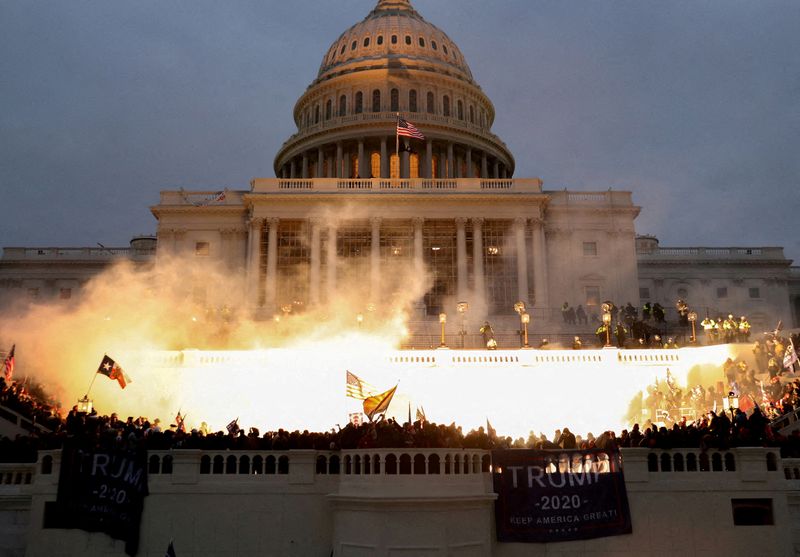By John Kruzel
WASHINGTON (Reuters) -The U.S. Supreme Court on Wednesday agreed to decide whether a man involved in the Jan. 6, 2021, U.S. Capitol assault can be charged with obstructing an official proceeding, a case with potential implications for the prosecution of Donald Trump.
The man is one of at least 325 people facing that charge for their alleged roles in the attack, which has also been brought against the Republican former president in the federal case charging him with trying to overturn his 2020 election defeat by Democratic President Joe Biden.
The justices said nothing about the Trump prosecution in agreeing to take up the case, but legal experts said Trump's lawyers could argue that the court's move should delay the start of his Washington trial on election subversion charges, currently due to begin in March.
Trump, the frontrunner for the 2024 Republican nomination to challenge Biden, is facing four concurrent criminal prosecutions. But the Washington case brought by U.S. Special Counsel Jack Smith is scheduled to begin first and is seen as the likeliest to be resolved before the Nov. 5 election.
The case taken up Wednesday by the justices involves defendant Joseph Fischer, who was indicted on seven charges following the Jan. 6 riot. Among his charges is one count under a provision of federal criminal law for anyone who "corruptly ... obstructs, influences and impedes any official proceeding."
The Supreme Court is expected to hear arguments in the case in the coming months and issue a ruling by the end of June.
It was not immediately clear how the Supreme Court's action on Wednesday might affect Trump's case. His lawyer did not immediately respond to a request for comment.
Typically, the Supreme Court agreeing to review an issue in one case would not be a basis for pausing a separate case that raises the same issue, said Barbara McQuade, a law professor at the University of Michigan and former top federal prosecutor appointed by then-President Barack Obama. Still, McQuade said she expects Trump's legal team to make the argument because delay "has been his strategy throughout all of these cases."
LIMITED FOCUS FOR CHARGE?
U.S. District Judge Carl Nichols, a Trump appointee, granted Fischer's pretrial motion to dismiss his obstruction charges, ruling that the statute applied only in cases in which a defendant had taken "some action with respect to a document, record or other object."
Federal prosecutors appealed that ruling to the U.S. Court of Appeals for the District of Columbia Circuit. A divided three-judge panel on the D.C. Circuit in April reversed Nichols' ruling, saying the statute was not limited to documents and records, but instead "applies to all forms of corrupt obstruction of an official proceeding."
The charge carries a maximum sentence of up to 20 years in prison with a conviction.
Fischer is awaiting trial on his other criminal charges, including one count of assaulting, resisting or impeding officers and one count of civil disorder, among other charges.
After the election, Trump and his allies made false claims that it had been stolen from him through widespread voting fraud. On Jan. 6, 2021, when Congress met to certify Biden's victory, Trump supporters stormed the Capitol, broke through barricades, attacked police officers, vandalized the building and forced lawmakers and others to flee for safety.

In federal charges brought by Special Counsel Smith, Trump faces four counts related to his efforts to overturn the 2020 election results: conspiracy to obstruct an official proceeding; obstruction of and attempt to obstruct an official proceeding; conspiracy to defraud the United States; and conspiracy to deprive citizens of their voting rights.
Trump has pleaded not guilty to his election-related charges, as well as charges stemming from three other ongoing state or federal criminal prosecutions.